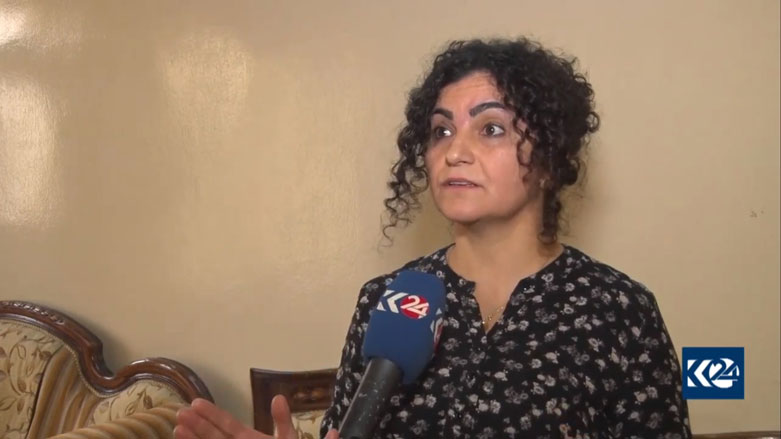Turkish-backed militia torches house of Syrian Kurdish artist

ERBIL (Kurdistan 24) – The house of the Kurdish artist Mizgîn Tahir, located in the Turkish-controlled town of Serekaniye (Ras al-Ain), was burned by Turkish-backed groups, she told Kurdistan 24.
Turkey took control of Serekaniye after Kurdish fighters withdrew on Oct. 20 from the city, previously besieged by Ankara as part of the US-Turkish ceasefire deal reached three days earlier.
The house was co-owned by the Kurdish documentary and filmmaker Azad Evdiki. His brother Teymour is married to Tahir.
Evdiki told Kurdistan 24 on Thursday that the Kurdish neighborhood is “controlled by the Sultan Murad and Hamzat brigades.” The two groups are members of the Turkish-backed Syrian National Army (SNA).
Battles previously took place in Serekaniye in 2013 between Kurdish and Islamist fighters in which the Kurds claimed victory.
“Our house is in a Kurdish neighborhood of the town, and even in the early conflict [2013], the [Islamist] groups could not enter those neighborhoods. Are they taking revenge? Why our house, specifically?,” Evdiki wondered aloud.
He said the house was filled with art and cultural works.
“Many in that house have made efforts in the area of writing, cinema, and literature. I think that is why the house has been set on fire. More than anything else, there were books in that house; books in Kurdish and Arabic, as well as historical books.”
“From that house, Teymour was doing cinematic work, Mizgin Taher became an opera performer, Sevinaz was working on music, Nariman, my sister, was studying literature. And I have worked both in cinema and [made] documentaries.”
Sevinaz was also part of the fourth edition of the Rojava Film Festival that was planned for November but which was canceled due to Turkey’s assault.
Mizgîn Tahir told Kurdistan 24 that, in the past, enemies of the Kurds have carried out genocides and divided Kurdistan, hidden in an age without mass media.
“But now, they can’t hide burning a house. When they burn this house, they know what they are doing. When they burn that library, they know what they are doing it because there is a fight between two sides in this world; between good and evil.”
“So when they burn that library, they show their ignorance and darkness. They don’t want the light to come up. They don’t want the people to open their eyes and know their rights. They know what they are doing. Our enemy is so smart. So the question is how should we be?”
It’s not the first time that the SNA has been accused of severe human rights abuses in the so-called “safe zone” between Tal Abyad and Serekaniye, controlled by Turkey.
According to a report of Human Rights Watch (HRW) released Nov. 27, Turkish-backed groups have summarily executed civilians, looted civilian houses and failed to account for aid workers who disappeared while working in the “safe zone.”
Read More: HRW: Turkish-backed groups involved in looting, summary executions in northern Syria
A Reuters journalist of Kurdish origin named Rodi Said also posted pictures of his house in Serekaniye on Oct. 30, claiming the group had occupied it.
“Executing individuals, pillaging property, and blocking displaced people from returning to their homes is damning evidence of why Turkey’s proposed ‘safe zones’ will not be safe,” said Sarah Leah Whitson, HRW’s Middle East director.
On Dec. 1, the SNA claimed in a statement that Human Rights Watch was not objective and that all their victim’s testimonies were Kurds, not Arabs.
However, accusations of human rights violations in the so-called safe zone keep surfacing from multiple sources.
On Wednesday, the Syrian Observatory for Human Rights (SOHR) reported that Turkish-backed factions began demolishing houses of Kurdish fighters in villages in Kormazat, south of the city of Tal Abyad.
Editing by John J. Catherine
